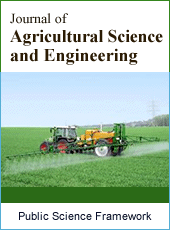Journal of Agricultural Science and Engineering
Articles Information
Journal of Agricultural Science and Engineering, Vol.1, No.3, Aug. 2015, Pub. Date: Jul. 29, 2015
The Influence of Personal Characteristics, Economic and Social Factors in Adoption of Improved Potato by Small Farmers to Sustain Their Livelihoods in Central Darfur
Pages: 153-162 Views: 5375 Downloads: 1036
[01]
Heitham Elhaj Mohammed Musa, Department of Agricultural Extension and Rural Development, Faculty of Agriculture, Sudan University of Science and Technology, Khartoum, Sudan.
[02]
Mohmed Badawi, Department of Agricultural Extension and Rural Development, Faculty of Agriculture, Sudan University of Science and Technology, Khartoum, Sudan.
[03]
Haj Hamed Abdelaziz, Department of Agricultural Extension and Rural Development, Faculty of Agriculture, Sudan University of Science and Technology, Khartoum, Sudan.
[04]
Abdel Mahmoud H. Elshaikh, Department of Agricultural Extension and Rural Development, Faculty of Agriculture, Sudan University of Science and Technology, Khartoum, Sudan.
This study was conducted as a contribution towards searching a performance of different personal characteristics, social and economic factors that increase small farms productivities using potato crops as sample in order to sustain the livelihoods and alleviating the poverty of the poor farmers who affected by Darfur conflict. This study is also an attempt to show the elements affected the adoption of improved potato crops and reaching recommendations that can be used for developing strategies for effective agricultural extension work and alleviation of poverty among the potato’s small farmers around central Darfur. The study revealed that there is positive relationship between personal characteristic (age, sex, education level, income and family size) and adoption of improved potato by small farmers in order to sustain their livelihoods and alleviate the poverty. The gender was found to have a significant association with adoption of recommended type of soil, sowing date and number of potato tuber per hole; however the gender had no relation with adoption of type of recommended irrigation, agriculture method, spacing between holes, and using of fertilizers. The age was found to have association with adoption of the recommended sowing date and type of irrigation but, there was no association between age and recommended cultivation methods, number of potato tuber, recommended fertilizers, spacing between holes and type of soil. The size of family was found to have a significant relation with adoption of recommended number of potato tuber per hole and had no association with recommended cultivation methods, type of irrigation, recommended fertilizers, spacing between holes and type of soil. The respondent’s social status was not found to have a significant relation with adoption of recommended type of irrigation, recommended fertilizers, number of potato tuber per hole, spacing between holes and type of soil. The family residence status was found to be having a significant association with adoption of recommended spacing between holes, recommended fertilizers and number of potato tubers per hole while there was no significant relation with adoption of recommended agriculture method, sowing date, type of recommended soil and type of irrigation.
Personal Characteristics, Economic and Social Factors, Adoption of Improved Potato, Small Farmers, Sustainable Livelihoods
[01]
NeBambi Lutaladio, Oscar Ortiz, Anton Haverkort and Daniel Caldiz - Sustainable potato production - FAO 2009.
[02]
(Kelly, Donna , David and C. Robin, A Guide to Growing Potatoes in your home Garden
[03]
Helen Young, Abbul Monim Osman (June 2005) - Darfur- livelihood under siege
[04]
Yasir Satti, Castro 2013 - Climate change paper
[05]
Patricia Justino 2011, Poverty and violent conflict- MICROCON Research working paper
[06]
Bundervoet, Tom & Philip Verwimp, 2005. ‘Civil War and Economic Sanctions: An Analysis of Anthropometric Outcomes in Burundi’, Households in Conflict Network, Working Paper 11(http://www.hicn.org/papers/wp11.pdf).
[07]
Helen Young, Karen, Osman 2007 – Livelihoods , Migration and conflict
[08]
Helen Young, Abdel Montum Osman 2007 – Sharpening the strategic Focus of livelihoods in the Darfur Region
[09]
Guha-Sapir and Degomme November 2006 – Darfur Crisis - Death Estimates Demonstrate Severity of Crisis, but Their Accuracy and Credibility Could Be Enhanced - GAO
[10]
Helen Young, Lisa Goldman 2015 - Livelihoods, Natural Resources, and Post-Conflict Peace building
[11]
Macro Kerste, N. Rosenboom 2008 – Financing Sustainability - UNEP

ISSN Print: 2381-6821
ISSN Online: 2381-6848
Current Issue:
Vol. 7, Issue 4, December Submit a Manuscript Join Editorial Board Join Reviewer Team
ISSN Online: 2381-6848
Current Issue:
Vol. 7, Issue 4, December Submit a Manuscript Join Editorial Board Join Reviewer Team
| About This Journal |
| All Issues |
| Open Access |
| Indexing |
| Payment Information |
| Author Guidelines |
| Review Process |
| Publication Ethics |
| Editorial Board |
| Peer Reviewers |


